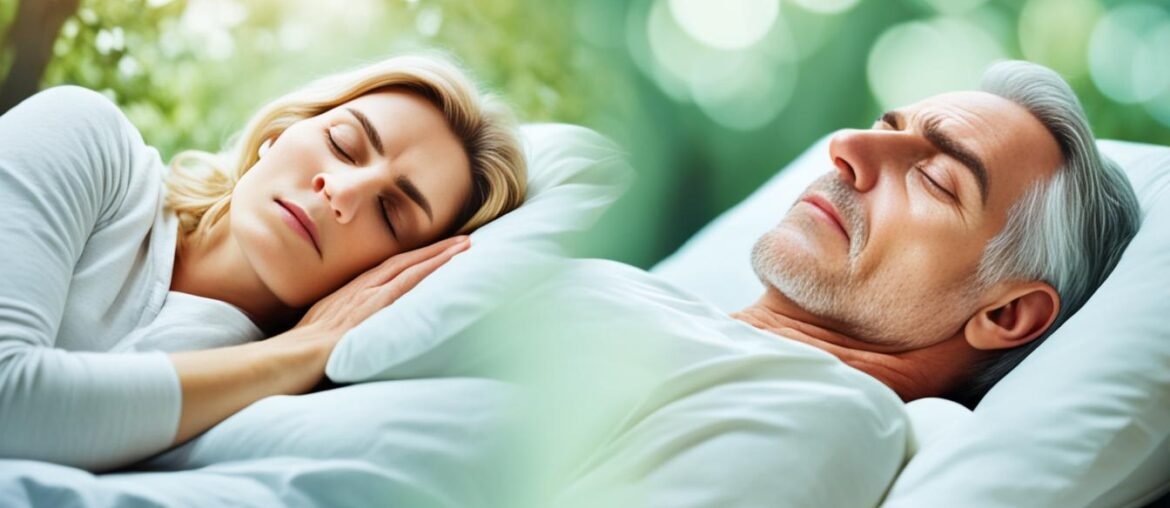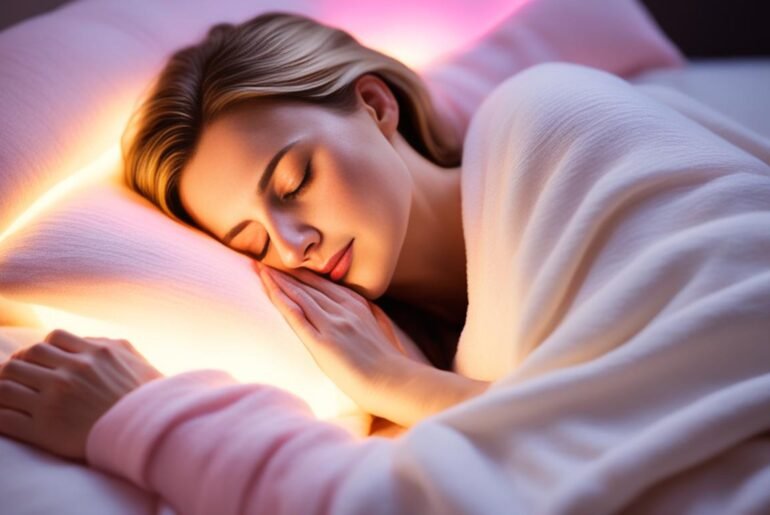Did you know that lack of sleep can contribute to the formation of wrinkles? It’s not just genetics and aging that play a role in the appearance of fine lines and sagging skin. Your sleeping habits and the quality of your sleep can have a significant impact on your skin health.
When you don’t get enough sleep, your body produces more cortisol, a stress hormone. Elevated levels of cortisol can break down collagen, the protein responsible for keeping your skin firm and elastic. As a result, the skin becomes more prone to wrinkles, and signs of aging become more prominent.
But it’s not just the quantity of sleep that matters. The position in which you sleep can also affect your skin’s health. Certain sleeping styles, such as sleeping on your side or stomach, can cause compression and pressure on the skin, leading to the formation of sleep wrinkles. These wrinkles tend to appear around the jawline, neck, cheeks, and crow’s feet region.
So, how can you prevent sleep wrinkles and maintain youthful-looking skin? In this article, we’ll explore the impact of sleep position on skin aging, provide tips for preventing sleep wrinkles, recommend products that can help, and discuss the overall importance of sleep for skin health.
Key Takeaways:
- Lack of sleep can contribute to the formation of wrinkles by increasing cortisol levels and breaking down collagen.
- Sleeping on your side or stomach can lead to the development of sleep wrinkles due to compression and pressure on the skin.
- Using proper sleeping positions, supportive pillows, and silk/satin pillowcases can help prevent sleep wrinkles.
- Applying skincare products with anti-aging ingredients and protecting your skin from sun damage during sleep are essential for maintaining youthful-looking skin.
- Adequate sleep promotes collagen production, skin cell regeneration, and overall skin health, resulting in a more radiant complexion.
How Sleep Position Affects Skin
When it comes to the health and appearance of your skin, your sleep position can play a significant role. The position in which you sleep can impact the formation of wrinkles and lines on your face. Let’s take a closer look at how sleep position affects your skin.
Sleeping on your side or stomach may seem comfortable, but it can expose your face to compression and frictional forces. Over time, this can lead to the development of sleep lines and wrinkles. These sleep lines can become more permanent if you consistently sleep in the same position, causing unwanted signs of aging to appear.
On the other hand, back sleeping is considered the best position for minimizing sleep wrinkles. When you sleep on your back, the distribution of gravity is more uniform, and there are fewer vectors pulling on your skin in different directions. This helps to reduce the development of sleep lines and wrinkles, keeping your skin smoother and more youthful-looking.
Choosing the right sleep position can make a noticeable difference in the appearance of your skin. By adopting the habit of back sleeping, you can help prevent the formation of sleep lines and wrinkles, ultimately promoting healthier and more youthful skin.
Tips for Preventing Sleep Wrinkles
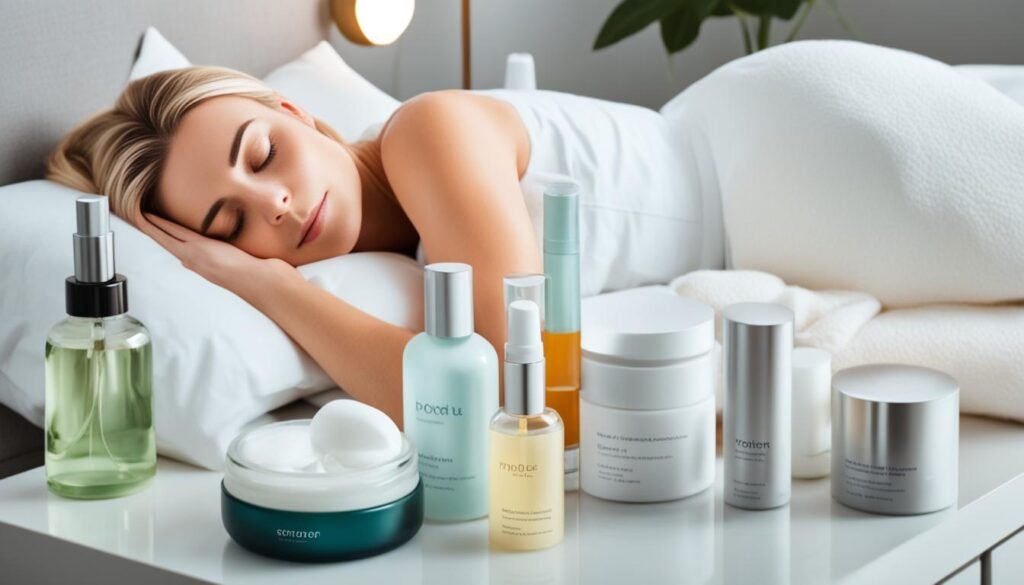
To prevent sleep wrinkles and maintain a youthful complexion, I have compiled a list of helpful tips that you can easily incorporate into your nighttime routine:
1. Use a Neck Pillow or Body Pillow
When you sleep on your side, using a neck pillow or body pillow can help fill the gap between your neck and shoulder. This prevents the skin from being compressed and reduces the chances of sleep wrinkles forming.
2. Consider an Anti-Aging Pillow
If you’re a back sleeper, using an anti-aging pillow specifically designed to support your head on both sides can keep you in a supine position throughout the night. This minimizes the pulling and tugging of the skin, reducing the risk of sleep wrinkles.
3. Opt for Silk or Smooth-textured Pillowcases
Switching to a silk or smooth-textured pillowcase can make a significant difference in preventing sleep wrinkles. These materials reduce friction and allow your skin to glide smoothly as you sleep, minimizing any potential skin pulling or dragging.
4. Apply Anti-Aging Skincare Products
Nighttime is an ideal opportunity to nourish and repair your skin. By incorporating anti-aging skincare products, such as those containing retinol, you can promote the production of collagen and prevent the formation of fine lines and wrinkles. Remember to follow the usage instructions for each product and consult with a dermatologist if needed.
Remember, adopting these tips can help you protect your skin and prevent the formation of sleep wrinkles. Incorporating these practices into your routine may take some time, but the long-term benefits for your skin will be well worth it!
Products to Help Prevent Sleep Wrinkles
There are various products available that can help prevent sleep wrinkles. Incorporating these anti-wrinkle products into your sleep routine can promote healthier and smoother-looking skin. Here are some options:
Satin or Silk Pillowcases
Satin or silk pillowcases are known for their smooth texture, which reduces friction and minimizes skin irritation while you sleep. Consider using pillowcases like the Bedsure Satin Pillowcase or Kitsch Satin Pillowcase. These pillowcases are designed to be gentle on the skin, helping to prevent sleep wrinkles.
100% Mulberry Silk Pillowcases
For even greater benefits, opt for 100% mulberry silk pillowcases such as the Zimasilk 100% Mulberry Silk Pillowcase or Slip Pure Silk Pillowcase. These luxurious pillowcases are highly recommended by users for their skin and hair benefits, including reducing the appearance of wrinkles.
Specialized Pillows
If you’re a side sleeper, specialized pillows can provide extra support and help prevent facial creases. Consider pillows like the Save My Face Le Petite Pillow or Osteo Cervical Pillow. These pillows are designed to distribute pressure evenly, minimizing the development of sleep wrinkles.
Adjustable Cervical Pillows
For proper alignment of your neck and head during sleep, try adjustable cervical pillows like the Famedio Adjustable Cervical Pillow. These pillows offer customizable support and can help reduce the formation of wrinkles caused by poor sleeping positions.
YourFacePillow Beauty Pillow
If you’re looking to transition to back sleeping, consider using the YourFacePillow Beauty Pillow. This specially designed pillow provides support and encourages back sleeping, which can help prevent sleep wrinkles.
Investing in these products can enhance your sleep experience and contribute to wrinkle prevention. Choose the option that suits your needs and preferences to wake up with smoother, more rejuvenated skin.
The Impact of Sleep on Skin Health

Quality sleep plays a crucial role in maintaining the health and vitality of our skin. During sleep, our body undergoes various restorative processes that are essential for the rejuvenation and repair of our skin cells. Let’s explore the significant impact that sleep has on our skin health.
1. Skin Cell Regeneration and Repair
While we sleep, the blood flow to our skin increases, facilitating the delivery of essential nutrients and oxygen. This increased blood circulation promotes the process of skin cell regeneration and repair. Our skin cells work diligently during this time to replenish and replace damaged cells, resulting in a healthier and rejuvenated complexion.
2. Collagen Production
Collagen, a vital protein responsible for skin elasticity and firmness, is produced during sleep. Collagen fibers provide structural support to the skin, preventing the formation of wrinkles and fine lines. Consistent and quality sleep allows our body to produce an adequate amount of collagen, promoting a youthful and supple appearance.
3. Benefits for Youthful Skin
The benefits of sleep for our skin go beyond cell regeneration and collagen production. When we get sufficient sleep, we provide our body with the opportunity to balance hormones, such as cortisol, which can influence our skin’s health. Quality rest also promotes a healthy immune system, contributing to the prevention of skin conditions and infections.
Sleep is the foundation of a healthy and youthful complexion. It allows our skin to repair, replenish, and regenerate, maintaining its natural beauty and glow.
By prioritizing sleep and establishing a consistent sleep routine, we can harness the incredible benefits it offers for our skin health. Let’s explore the detrimental effects that sleep deprivation can have on our skin in the next section.
The Effects of Sleep Deprivation on Skin
Sleep deprivation can have detrimental effects on the health and appearance of your skin. Lack of sleep can accelerate the aging process and contribute to the formation of wrinkles. When you don’t get enough sleep, your skin’s ability to recover from environmental stressors, such as sun exposure, is compromised. This can lead to a decrease in skin satisfaction and quality.
One of the noticeable effects of sleep deprivation is the appearance of hanging eyelids, swollen eyes, and dark under-eye circles. The delicate skin around the eyes is particularly vulnerable to the effects of sleep deprivation, as it is thinner and more prone to fluid retention. Lack of sleep can also result in paler skin, as reduced blood flow can make the complexion appear dull and sallow.
“Sleep deprivation can accelerate the aging process and lead to the formation of wrinkles.”
Sleep is important for the overall health and well-being of your skin. During sleep, your body goes through a regenerative process that helps repair and rejuvenate the skin. It is during this time that collagen production occurs, which helps maintain the skin’s elasticity and prevents the formation of wrinkles.
In addition to its impact on collagen production, sleep deprivation can also affect the skin’s natural moisture balance. Lack of sleep can disrupt the skin’s barrier function, leading to increased water loss and dehydration. This can make the skin appear dry, rough, and more susceptible to the development of fine lines and wrinkles.
To combat the effects of sleep deprivation on your skin, it is important to prioritize quality sleep and establish a regular sleep routine. Creating a comfortable sleeping environment, practicing relaxation techniques before bed, and limiting exposure to electronic devices can all help promote better sleep. Additionally, maintaining a consistent skincare routine that includes moisturizing and protecting the skin from environmental stressors can help counteract the negative effects of sleep deprivation.
By understanding the impact of sleep deprivation on your skin and taking steps to prioritize quality sleep, you can help maintain a youthful and radiant complexion.
The Connection Between Sleep and Collagen
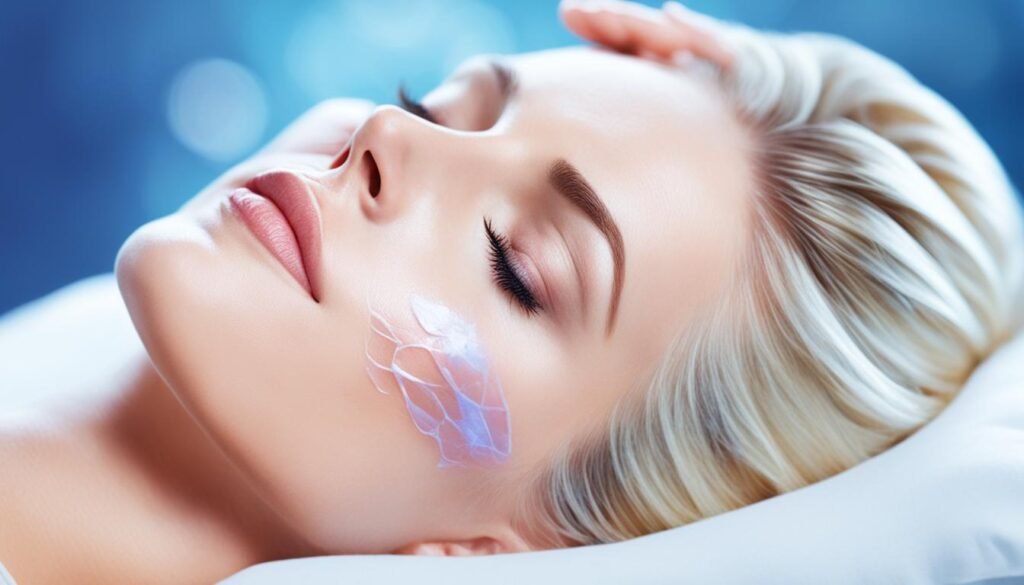
Sleep plays a crucial role in collagen synthesis, the process of producing collagen in the body. Collagen is a protein that provides structural support and elasticity to the skin. During sleep, the body produces more collagen, which helps in maintaining a firm and wrinkle-free complexion. Sleep deprivation can disrupt collagen production and contribute to the formation of wrinkles.
Collagen Synthesis During Sleep
Collagen production is at its peak during sleep, particularly during the deep sleep stages. These stages, also known as slow-wave sleep, are responsible for tissue repair and restoration throughout the body, including the skin. During this time, the body releases growth hormones that stimulate collagen synthesis and repair damaged tissues.
| Sleep Stage | Collagen Synthesis |
|---|---|
| Deep Sleep | High |
| REM Sleep | Moderate |
| Light Sleep | Low |
As collagen is the main structural component of the skin, its synthesis during sleep helps in maintaining skin thickness, firmness, and elasticity. The natural rejuvenation process that occurs during sleep ensures that the skin remains youthful and wrinkle-free.
Proper sleep is akin to a beauty treatment from within.
Disrupting the sleep-wake cycle, whether due to sleep disturbances, insomnia, or chronic sleep deprivation, can negatively impact collagen production. Insufficient sleep can impair the body’s ability to repair and regenerate collagen, leading to premature aging signs like wrinkles, fine lines, and sagging skin.
To maintain optimal collagen production and preserve skin health, it is essential to prioritize quality sleep and establish healthy sleep habits.
The Importance of Sun Protection During Sleep

Even while we sleep, our skin is vulnerable to the damaging effects of the sun. Sun damage can have a detrimental impact on the health and appearance of our skin, leading to the breakdown of elastic fibers and the loss of collagen. In order to safeguard our skin from these harmful UV rays, it is crucial to ensure adequate sun protection during the day and create a sleeping environment that is free from direct sunlight.
Direct exposure to the sun while sleeping can result in a variety of skin issues, including wrinkles and premature aging. The sun’s rays can penetrate through windows and curtains, causing damage that accumulates over time. Prolonged sun exposure can lead to the breakdown of elastic fibers, resulting in sagging skin, and diminish the production of collagen, a protein responsible for maintaining the skin’s integrity and youthful appearance.
In order to protect our skin from sun damage during sleep, here are some important tips to follow:
- Keep your sleep environment shielded from direct sunlight by using blackout curtains or blinds.
- Ensure that your bedroom curtains are closed during the daytime to minimize sun exposure.
- Apply a broad-spectrum sunscreen with a high SPF before going to bed, especially if your sleeping area receives direct sunlight.
- Consider using sun-protective clothing or accessories, such as a wide-brimmed hat or a sleep mask with built-in UPF protection.
By taking these precautions, you can reduce the risk of sun damage to your skin, even during sleep. Protecting your skin from harmful UV rays is essential for maintaining its health, preventing premature aging, and promoting a youthful complexion.
Benefits of Sun Protection During Sleep
Ensuring sun protection during sleep offers several benefits for your skin:
- Prevents the breakdown of collagen and elastin fibers, preserving the skin’s elasticity and suppleness.
- Reduces the risk of developing wrinkles, fine lines, and other signs of skin aging.
- Minimizes the chances of developing sunspots and hyperpigmentation.
- Supports overall skin health and maintains a youthful complexion.
Remember, protecting your skin from the sun’s harmful rays is an essential part of any skincare routine, even during sleep. By prioritizing sun protection, you can help maintain the health and appearance of your skin, ensuring a radiant and youthful glow.
| Sun Protection Tips During Sleep | Product Suggestions |
|---|---|
| Avoid direct sunlight in your sleeping environment | |
| Close bedroom curtains during the day | |
| Apply broad-spectrum sunscreen before bed | |
| Utilize sun-protective clothing and accessories |
The Role of Hydration in Preventing Wrinkles During Sleep
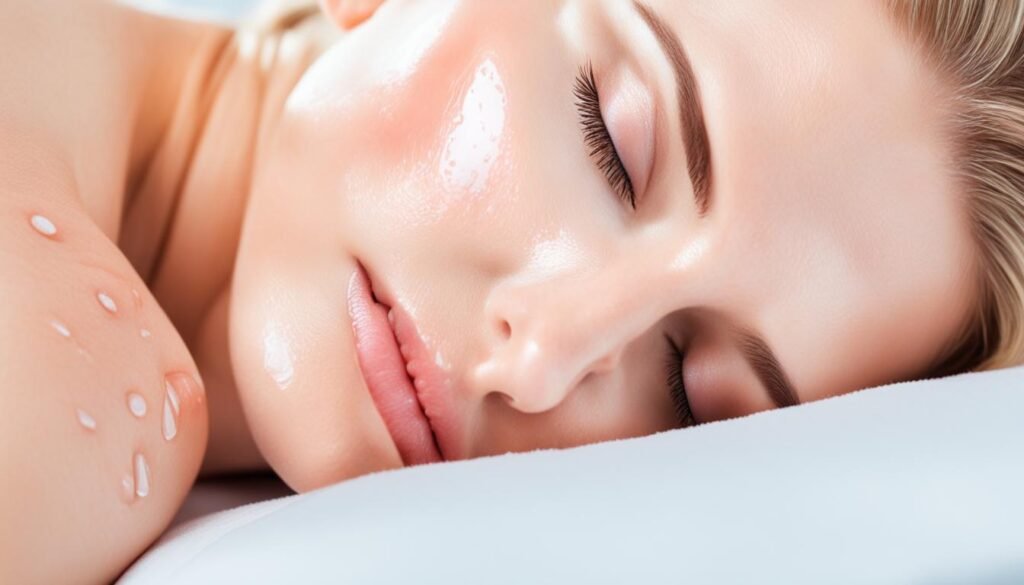
Proper hydration is essential for maintaining healthy and youthful-looking skin. During sleep, the skin can become dehydrated, especially in low-humidity environments. Using a moisturizer before bed helps to replenish and lock in moisture, preventing dryness and the formation of wrinkles. Overnight moisturizers and sleeping masks are specifically formulated to provide intense hydration and nourishment to the skin.
| Product | Description |
|---|---|
| Neutrogena Hydro Boost | A lightweight gel moisturizer that delivers deep hydration throughout the night. |
| CeraVe PM Facial Moisturizing Lotion | Contains essential ceramides to help restore the skin’s natural barrier and retain moisture. |
| Laneige Water Sleeping Mask | An overnight mask that provides intense hydration and promotes radiant, plump skin. |
Proper hydration is not only beneficial for preventing wrinkles but also plays a significant role in maintaining overall skin health. By keeping the skin well-hydrated, you can improve its elasticity, smoothness, and natural glow.
Remember to drink an adequate amount of water throughout the day to support skin hydration from within. Additionally, incorporating foods rich in water content, such as watermelon and cucumber, can further contribute to hydrating your skin.
The Benefits of Retinol for wrinkle prevention
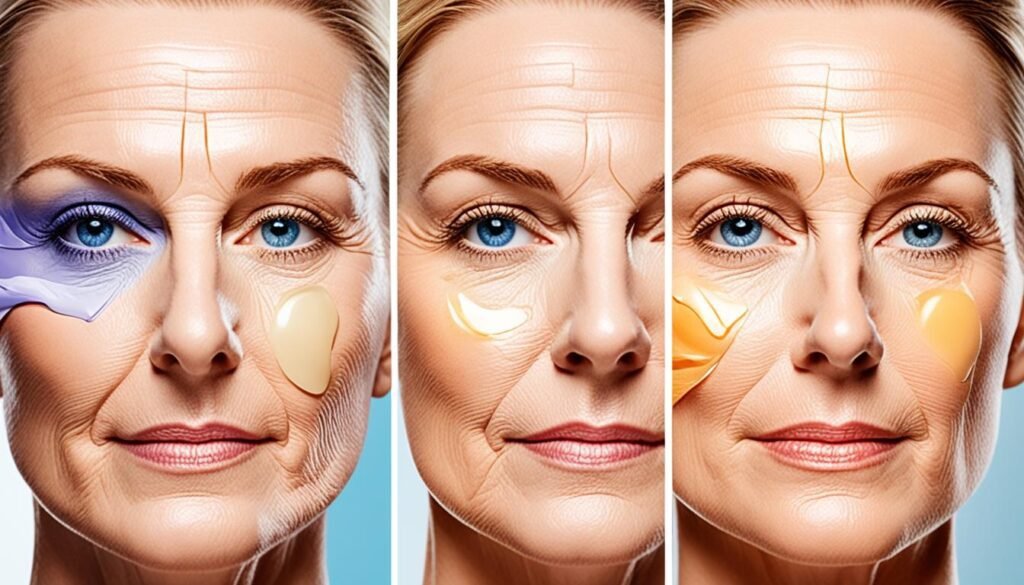
When it comes to reducing the appearance of wrinkles and fine lines, retinol is a powerful ingredient to consider. Its role in promoting anti-aging effects is well-known in the skincare industry. By encouraging collagen production, retinol helps to improve skin texture and tone, leaving you with a smoother and more youthful complexion.
One of the best ways to harness the benefits of retinol is by incorporating retinol-based products into your nighttime skincare routine. Applying these products at night allows the skin to absorb the active ingredients more effectively, promoting cellular renewal and aiding in wrinkle prevention.
However, it’s important to note that retinol can increase your skin’s sensitivity to the sun. To protect your skin from potential sun damage, it is crucial to use sunscreen during the day when using retinol-based products.
Top Retinol Products for Wrinkle Prevention
| Product | Description | Price |
|---|---|---|
| 1. Retinol Serum by Paula’s Choice | A highly acclaimed retinol serum that delivers visible results in reducing wrinkles and fine lines. | $49 |
| 2. Retinol Cream by RoC | An affordable and effective retinol cream that helps to improve skin firmness and elasticity. | $22 |
| 3. Retinol Moisturizer Cream by LilyAna Naturals | A moisturizing cream enriched with retinol, hyaluronic acid, and organic ingredients for smoother and more youthful-looking skin. | $19 |
Remember, consistency is key when using retinol products. It may take some time for results to become noticeable, so be patient and stick to your skincare routine. Consulting with a dermatologist can also help you determine the best retinol product for your specific skin concerns and needs.
“Retinol is a game-changer when it comes to reducing wrinkles. Its ability to stimulate collagen production and enhance skin texture makes it an essential ingredient in any anti-aging regimen.” – Dr. Sarah Thompson, Board-Certified Dermatologist
Conclusion
Quality sleep is a key factor in the prevention of skin wrinkles and the promotion of overall skin health. By adopting proper sleep positions, using appropriate pillows and pillowcases, and following a consistent skincare routine, you can minimize the formation of sleep wrinkles. However, it’s important to also consider the impact of sleep deprivation, sun damage, and hydration on skin aging.
Incorporating products with retinol, such as the SkinCeuticals Retinol 0.5 Refining Night Cream or the Paula’s Choice Clinical 1% Retinol Treatment, can further support your efforts in preventing wrinkles. These products stimulate collagen production and improve skin texture and tone.
Additionally, don’t forget the importance of sun protection during the day. Applying a broad-spectrum sunscreen like the EltaMD UV Clear Facial Sunscreen or La Roche-Posay Anthelios Melt-in Sunscreen Milk SPF 60 can help safeguard your skin from harmful UV rays.
By prioritizing quality sleep and attending to your skin’s needs during the night, you can enhance your youthful appearance and maintain a radiant complexion for years to come.
FAQ
How does sleep position affect the formation of wrinkles?
Sleeping on your side or stomach can contribute to the formation of sleep wrinkles due to compression and pressure on the skin, which can break down collagen and cause lines to form.
What is the best sleeping position for minimizing sleep wrinkles?
Back sleeping is the best position for minimizing sleep wrinkles as it allows for uniform distribution of gravity and prevents vectors from pulling the skin in different directions.
Are there any tips for preventing sleep wrinkles?
Yes, using a neck pillow or body pillow to fill the gap between your neck and shoulder when side sleeping can help. Also, using an anti-aging pillow designed to keep you in a supine position and using a silk or smooth-textured pillowcase to reduce friction can be beneficial.
Are there any products that can help prevent sleep wrinkles?
Yes, there are satin or silk pillowcases available that reduce friction and minimize skin irritation, such as the Bedsure Satin Pillowcase and Kitsch Satin Pillowcase. Specialized pillows like the Save My Face Le Petite Pillow and Osteo Cervical Pillow can provide support and prevent facial creases. 100% mulberry silk pillowcases, like the Zimasilk 100% Mulberry Silk Pillowcase and Slip Pure Silk Pillowcase, have also been recommended for their skin and hair benefits. The YourFacePillow Beauty Pillow is an option for those who want to transition to back sleeping.
How does sleep impact skin health?
During sleep, blood flow to the skin increases, allowing for skin cell regeneration and repair. Collagen production, which helps maintain the skin’s elasticity and prevent wrinkles, also occurs during sleep.
What are the effects of sleep deprivation on the skin?
Sleep deprivation can accelerate the aging process and lead to the formation of wrinkles. It can also affect the skin’s ability to recover from environmental stressors and result in decreased skin satisfaction and quality, as well as the appearance of hanging eyelids, swollen eyes, dark under-eye circles, and paler skin.
What is the connection between sleep and collagen?
Sleep plays a crucial role in collagen synthesis, the process of producing collagen in the body. Collagen is a protein that provides structural support and elasticity to the skin. Sleep deprivation can disrupt collagen production and contribute to the formation of wrinkles.
Why is sun protection important during sleep?
Direct exposure to the sun while sleeping can lead to skin damage, including the breakdown of elastic fibers and loss of collagen. It is important to protect the skin from sun exposure during the day and ensure that the sleeping environment is free from direct sunlight.
How does hydration affect wrinkles during sleep?
Proper hydration is essential for maintaining healthy and youthful-looking skin. During sleep, the skin can become dehydrated, especially in low-humidity environments. Using a moisturizer before bed helps to replenish and lock in moisture, preventing dryness and the formation of wrinkles.
What are the benefits of using retinol for wrinkle prevention?
Retinol is a powerful ingredient for reducing the appearance of wrinkles and fine lines. It encourages collagen production and helps to improve skin texture and tone. Applying retinol-based products at night allows the skin to absorb the active ingredients and promote cellular renewal.

